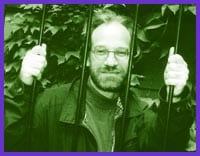The best way to stop police from spoiling orgies and other hedonistic activities is to make the state look silly, says maverick constitutional lawyer Alan Young.
“Use the press as the ears and eyes of the community, report back to the community, and make fun of the state,” Young told activists at a forum on changing Canada’s “outdated” sex laws.
“Take them on. Ridicule them. Tell them how bizarre it is.”
Young was one of several speakers at last weekend’s forum at the University of Toronto titled, Beyond The Bedrooms Of The Nation.
If Young’s advice seems destined to go up in smoke, consider his efforts on behalf of PWA Jim Wakeford.
He recently won Wakeford a constitutional exemption against prosecution for using marijuana.
The trick was reminding folks how uptight some laws are.
“I will raise the issue of how absurd it is that people are being shot and killed while being raided for marijuana cultivation. I mean, what the hell is going on in this country? The same thing can be done in terms of sexual regulations.”
Whether or not the panel’s sponsor, the June 13 Committee, can convince the courts to chill on consensual sex is not the issue, Young said.
“All I’m doing is parading information before the court so it will get back to the public.”
He said both dopers and homos are winning their respective debates in the court of public opinion, and the state is growing frightened.
“When courts start intervening in an activist way, that’s how you get law reform,” Young said.
“Regardless of whether you’re masturbating or engaging in orgiastic behaviour, it doesn’t matter. Those are fundamental personal decisions. They may not be conventional, but a little exotica doesn’t take it out of the spectrum of fundamental personal decisions. The farther you get away from conventional sex, we hear it’s horrible, that it’s destroying the community.
“What we have to do is say, ‘Wait a minute. These are assumptions we’ve made for 300 years. Where is the proof?'”
Young also told activists to find ways of making it more expensive for police and prosecutors to prove their cases against public sex.
“I try to make the costs and efforts of law enforcement insurmountable. So what you do is you try to raise legal issues in the context of your area that will require police to do more and more work.”
Beyond saying that marijuana laws are bad, for example, Young has taken to forcing prosecutors to test for THC levels to prove that they have confiscated an intoxicating herb.
“If they were disinclined already to enforce the law, you add a cost to it and you get results.”
But while Young says a low-budget campaign to change sex laws can be done, he admits that legislators aren’t in a hurry to act.
“They had their big to-do in ’69 when Trudeau said the state has no place in the bedrooms of the nation. They made some changes in the area of some Victorian-era sex offences, and that’s it. That’s your law reform for the next 50 years.
“The reality is, no one else cares. If we can convince the court that is an eligible defence, then it’s going to be difficult to enforce.”

 Why you can trust Xtra
Why you can trust Xtra


